“Look to God and Live”
Numbers 11–14; 21:1–9
LDS manual: here
Reading
Well, we blasted through Exodus pretty fast, and now, according to the church-approved lesson manual, we’re up to Numbers. Wait — did we miss something?
Leviticus. We totally skipped Leviticus, the chapter where the god of the universe gives his perfect law for mankind. So let’s hit the highlights of Leviticus.
Animal sacrifice
God starts out by telling how to sacrifice animals. Why? He likes the smell.
1:11 …it is a burnt sacrifice, an offering made by fire, of a sweet savour unto the LORD.
In every age, people try to make their god into whatever they admire. In the past, people who admired war and conquest said that God was a god of war and conquest. Now Christians who admire science say that their god created science. A bit hard to harmonise those two things: God’s the ultimate scientist, he has enough intelligence to create the universe… and he likes the smell of burning goat.
Eating blood
7:27 Whatsoever soul it be that eateth any manner of blood, even that soul shall be cut off from his people.
This verse shows God’s intention to let as many Jehovah’s Witnesses as possible bleed to death.
God fails biology
God misclassifies rabbits as ruminants.
11:6 And the hare, because he cheweth the cud, but divideth not the hoof; he is unclean unto you.
And God doen’t seem to realise that insects have six legs and not just four.
11:21 Yet these may ye eat of every flying creeping thing that goeth upon all four, which have legs above their feet, to leap withal upon the earth;
11:22 Even these of them ye may eat; the locust after his kind, and the bald locust after his kind, and the beetle after his kind, and the grasshopper after his kind.
11:23 But all other flying creeping things, which have four feet, shall be an abomination unto you.
11:24 And for these ye shall be unclean: whosoever toucheth the carcase of them shall be unclean until the even.
Leprosy
Here’s an interesting bit on leprosy. Leprosy at this time was a general term for a range of infections that could turn patches of your skin white and maybe do other nasty things; it wasn’t necessarily the skin-falling-off disease upon which so many jokes have been based. Even so, having leprosy meant you were bad news.
13:2 When a man shall have in the skin of his flesh a rising, a scab, or bright spot, and it be in the skin of his flesh like the plague of leprosy; then he shall be brought unto Aaron the priest, or unto one of his sons the priests:
13:3 And the priest shall look on the plague in the skin of the flesh: and when the hair in the plague is turned white, and the plague in sight be deeper than the skin of his flesh, it is a plague of leprosy: and the priest shall look on him, and pronounce him unclean.
And then you’d have to go away. That makes sense from an epidemiology point of view. But what happened if you had so much leprosy that your entire skin turned white?
13:12 And if a leprosy break out abroad in the skin, and the leprosy cover all the skin of him that hath the plague from his head even to his foot, wheresoever the priest looketh;
13:13 Then the priest shall consider: and, behold, if the leprosy have covered all his flesh, he shall pronounce him clean that hath the plague: it is all turned white: he is clean.
If you’re all leprous, then you’re fine again! Welcome back in, brother — you’re clean!
The impression I’m left with is that the Israelites didn’t mind leprosy so much; they just didn’t like people with two colours of skin. Well, just like they didn’t like two kinds of cloth mixed together, or two different animals ploughing the field together. All part of their obsession with purity. No mixing.
Sexual discharges
Let’s let the Brick Testament take up the story for the rules about sexual discharges.
(Why does this Lego guy not have a giant yellow dong in his hand? Judging by the size of his hand, he’d have some impressive girth. Might put me off the movie though, so it’s probably just as well.)
Scapegoating
16:22 And the goat shall bear upon him all their iniquities unto a land not inhabited: and he shall let go the goat in the wilderness.
Seems cruel to pretend to put your sins onto a goat and drive it out into the wilderness to die of exposure, doesn’t it? I guess it made them feel better, and that’s what matters.
It’s good to remember, as well, that the idea of a scapegoat would be picked up in the central doctrine of Christianity: you can avoid responsibility for your actions by putting them onto an innocent person.
Gay guys
18:22 Thou shalt not lie with mankind, as with womankind: it is abomination.
20:13 If a man also lie with mankind, as he lieth with a woman, both of them have committed an abomination: they shall surely be put to death; their blood shall be upon them.
Jehovah (which, remember, is Jesus) commands the Israelites to kill gay men. Apparently lesbians are okay — everyone likes lesbians! Except Paul, and he didn’t really like anyone.
People tell me that god is just fine with gay people now — that was the Old Testament! Why, Jesus said nothing about gay people at all!
I always respond: I’m not going to support the god of the Bible just because he doesn’t feel like killing gay people… anymore. When and why did he change his mind? Isn’t it more likely that society changed so it’s not okay to kill gay people anymore, and religion had to adapt?
It’s worth mentioning here that a lot of Christians are down with this one part of Leviticus, but not any of the others — like shellfish being an abomination — because it aligns with what they want to believe. This is cherry-picking.
As pilloried by President Bartlett on The West Wing.
One more:
Rules about bestiality.
18:23 Neither shalt thou lie with any beast to defile thyself therewith: neither shall any woman stand before a beast to lie down thereto: it is confusion.
20:15 And if a man lie with a beast, he shall surely be put to death: and ye shall slay the beast.
20:16 And if a woman approach unto any beast, and lie down thereto, thou shalt kill the woman, and the beast: they shall surely be put to death; their blood shall be upon them.
Harsh.
Love thy neighbour
19:18 Thou shalt not avenge, nor bear any grudge against the children of thy people, but thou shalt love thy neighbour as thyself: I am the LORD.
This sounds nice, but it doesn’t refer to loving everyone; it refers to your literal neighbour; the guy in the next tent. Those people across the river are fair game. However, the rule also extends to non-Israelites living among you:
19:34 But the stranger that dwelleth with you shall be unto you as one born among you, and thou shalt love him as thyself; for ye were strangers in the land of Egypt: I am the LORD your God.
Handicapped people shouldn’t come to church. God’s not into them.
21:17 Speak unto Aaron, saying, Whosoever he be of thy seed in their generations that hath any blemish, let him not approach to offer the bread of his God.
21:18 For whatsoever man he be that hath a blemish, he shall not approach: a blind man, or a lame, or he that hath a flat nose, or any thing superfluous,
21:19 Or a man that is brokenfooted, or brokenhanded,
21:20 Or crookbackt, or a dwarf, or that hath a blemish in his eye, or be scurvy, or scabbed, or hath his stones broken;
Stones broken. Sounds painful.
Blasphemers are to be put to death.
24:16 And he that blasphemeth the name of the LORD, he shall surely be put to death, and all the congregation shall certainly stone him: as well the stranger, as he that is born in the land, when he blasphemeth the name of the Lord, shall be put to death.
This scripture was invoked in colonial New Hampshire.
If any pson wthin ye Province professing ye true God shall wittingly and willingly presume to blaspheme the wholly name of God, Father, Son or Holy Ghost, wth direct, express, presumptions or high-handed blasphemy, either by willful or obstinate denying ye true God or his creation or Governmt of ye world, or shall curse God, Father, Son, or Holy Ghost, such pson shall be put to death. Levit. 24: 15 and 16.
Notice that you didn’t have to actually say anything blasphemous. All you had to do was deny that a god created the world.
Here was the punishment for blasphemy in Maryland:
[Pg 143] In Maryland blasphemy was similarly punished. For the first offense the tongue was to be bored, and a fine paid of twenty pounds. For the second offense the blasphemer was to be stigmatized in the forehead with the letter B and the fine was doubled. For the third offense the penalty was death. Until the reign of Queen Anne the punishment of an English officer for blasphemy was boring the tongue with a hot iron.
24:16 And he that blasphemeth the name of the LORD, he shall surely be put to death, and all the congregation shall certainly stone him: as well the stranger, as he that is born in the land, when he blasphemeth the name of the Lord, shall be put to death.
If any pson wthin ye Province professing ye true God shall wittingly and willingly presume to blaspheme the wholly name of God, Father, Son or Holy Ghost, wth direct, express, presumptions or high-handed blasphemy, either by willful or obstinate denying ye true God or his creation or Governmt of ye world, or shall curse God, Father, Son, or Holy Ghost, such pson shall be put to death. Levit. 24: 15 and 16.
[Pg 143] In Maryland blasphemy was similarly punished. For the first offense the tongue was to be bored, and a fine paid of twenty pounds. For the second offense the blasphemer was to be stigmatized in the forehead with the letter B and the fine was doubled. For the third offense the penalty was death. Until the reign of Queen Anne the punishment of an English officer for blasphemy was boring the tongue with a hot iron.
Aren’t you glad we live in a time when religious authority has been largely defanged by secularism? I’m very critical of Islamic countries, where this kind of thing is still going on, but it’s worth remembering that Christians have pulled this stuff whenever they could get away with it. Islam is terrible, but it’s not uniquely terrible. Any religion could assert itself like this if left unchecked.
Slavery again
25:10 And ye shall hallow the fiftieth year, and proclaim liberty throughout all the land unto all the inhabitants thereof: it shall be a jubile unto you; and ye shall return every man unto his possession, and ye shall return every man unto his family.
You’re supposed to set free your slaves. Hey, that sounds good! Oh, wait — that’s only if your slaves are Hebrews.
25:44 Both thy bondmen, and thy bondmaids, which thou shalt have, shall be of the heathen that are round about you; of them shall ye buy bondmen and bondmaids.
25:45 Moreover of the children of the strangers that do sojourn among you, of them shall ye buy, and of their families that are with you, which they begat in your land: and they shall be your possession.
25:46 And ye shall take them as an inheritance for your children after you, to inherit them for a possession; they shall be your bondmen for ever: but over your brethren the children of Israel, ye shall not rule one over another with rigour.
You’re allowed to own heathen slaves, and not only that, if they have children, you inherit them. Slave babies!
God threatens those who don’t keep his commandments. With cannibalism.
26:27 And if ye will not for all this hearken unto me, but walk contrary unto me;
26:28 Then I will walk contrary unto you also in fury; and I, even I, will chastise you seven times for your sins.
26:29 And ye shall eat the flesh of your sons, and the flesh of your daughters shall ye eat.
Reading Leviticus is kind of strange. Here’s the word of the god of the universe. He could tell humanity anything about health, the cosmos, or anything. And what does he focus on? A lot of irrelevant, cruel, and discriminatory rules that sounds like they came from a bunch of goat herders. We won’t see much better from this god for a long time.
Numbers
Now we rejoin the lesson.
Ch. 11: There’s an interesting episode in Numbers 11, in which two men start prophesying. Joshua tells Moses about it, and asks him to get them to stop.
11:27 And there ran a young man, and told Moses, and said, Eldad and Medad do prophesy in the camp.
11:28 And Joshua the son of Nun, the servant of Moses, one of his young men, answered and said, My lord Moses, forbid them.
11:29 And Moses said unto him, Enviest thou for my sake? would God that all the LORD’s people were prophets, and that the LORD would put his spirit upon them!
This is a tricky issue. If you insist that all the revelation has to come from the top, you maintain tight control, but you squash the spiritual expression of the rank and file membership, and breed dissatisfaction. On the other hand, if you throw revelation open to everyone, then the religion turns into a circus, with everyone claiming authority for every wacky notion that pops into their heads… including leadership challenges and factional splintering.
Mormonism has hit on an amazingly clever strategy that solves this problem: everyone can have revelation, but only for areas within their domain. One’s domain is a stake if you’re a stake president, a ward if you’re the bishop, a family if you’re a man, or if you’re a woman, just yourself. (See the section below on misogyny.) And of course, the president of the church gets revelation for the whole church.
While I have no admiration for the control that the LDS Church has over its members or for revelation in general, I have to kind of stand in awe of this solution. It allows members to have some control over their own spiritual self-expression, while keeping it within a limited scope that doesn’t threaten the church hierarchy. It also allows leaders to pull the plug on non-hierarchical ‘revelation’ that gets out of hand. Quite brilliant, really.
Ch. 14: Moses does a clever bit of jiu-jitsu on one of the many occasions when God wants to destroy the Israelites, saying in effect, “If you destroy us, what will the other tribes think about your power?”
14:15 Now if thou shalt kill all this people as one man, then the nations which have heard the fame of thee will speak, saying,
14:16 Because the LORD was not able to bring this people into the land which he sware unto them, therefore he hath slain them in the wilderness.
14:20 And the LORD said, I have pardoned according to thy word:
At this point, God has some buyer’s remorse about tying himself too closely with the Israelites. His later attempt to circumvent this by acquiring a bunch of Christians will be unsuccessful, as he finds that they’re equally annoying.
Ch. 15: The Israelites kill a man for gathering sticks on the Sabbath.
15:32 And while the children of Israel were in the wilderness, they found a man that gathered sticks upon the sabbath day.
15:33 And they that found him gathering sticks brought him unto Moses and Aaron, and unto all the congregation.
15:34 And they put him in ward, because it was not declared what should be done to him.
15:35 And the LORD said unto Moses, The man shall be surely put to death: all the congregation shall stone him with stones without the camp.
15:36 And all the congregation brought him without the camp, and stoned him with stones, and he died; as the LORD commanded Moses.
It’s issues like this that make me think: Thank goodness the government is in mostly secular hands.
Chs. 11 & 16: God kills a lot of people in Numbers. He kills people with a surfeit of quail for complaining. Then he kills the people of Korah for complaining, and then the people who complained about that. I guess what this lesson is meant to reinforce is that God hates complainers, and loves the docile, obedient, and compliant.
Main points from this lesson
The Bible reflects a profoundly misogynistic worldview
- Women are unclean for a week after having a baby boy, but if it’s a girl, the woman is unclean for two weeks.
12:2 Speak unto the children of Israel, saying, If a woman have conceived seed, and born a man child: then she shall be unclean seven days; according to the days of the separation for her infirmity shall she be unclean.
12:3 And in the eighth day the flesh of his foreskin shall be circumcised.
12:4 And she shall then continue in the blood of her purifying three and thirty days; she shall touch no hallowed thing, nor come into the sanctuary, until the days of her purifying be fulfilled.
12:5 But if she bear a maid child, then she shall be unclean two weeks, as in her separation: and she shall continue in the blood of her purifying threescore and six days.
- God wraps up Leviticus by estimating the value of a human being. Women are worth less than men.
- Notice also that only men are included in the numbering of Israel, including male babies. Women are not counted.
- And of course, Miriam was punished with leprosy for criticising Moses. Aaron did the same thing, but wasn’t. I’ve had it explained that her sin was especially grievous because she was a woman, and it’s especially bad for a woman to criticise the prophet.
This doesn’t do much to make women feel worthwhile. And we can see echoes of this misogyny all through modern Christianity. Mormons, most recently, have steadfastly refused to ordain women. They’re ready to go to the wall for this, just like they went to the wall for denying the priesthood to people of African descent. And it’s sad to watch Mormons taking this stand because you know they’re going to have to walk it back before too long.
Unfunny joke: What’s the difference between Mormon doctrine and not Mormon doctrine?
Answer: About 40 years.
Do these biblical laws have a practical basis?
Growing up in the church, I was always taught that, while the Levitical laws were unusual, there was actually a point to them. For example, not eating pork. The story was that at that time, pork was unsafe to eat (trichinosis was mentioned), so the anti-pork law served as a kind of protection for the Israelites.
Not quite. As Christopher Hitchens pointed out in chapter 3 of God Is Not Great, other people in that area and time ate pork with no ill effects. Archaeologists can tell the Jewish sites from the non-Jewish sites by going through their garbage dumps and finding pig bones or no pig bones.
So why the prohibition? Hitches puts it down to an aversion to anything that might seem like cannibalism — even the Polynesians called people ‘long pig’. This all seems plausible enough. But in the end, who knows why a religious taboo catches on? Why do Jews have a name-avoidance taboo while others don’t? Why do Australian Aboriginal cultures avoid spiritual places, while Western new-age hippies flock to them? Really just cultural build-up.
Why do religions do weird things?
If there’s one thing that characterises the diversity of religions, it’s their interesting and idiosyncratic practices. But why do religions build these up?
I’d say the answer is essentially one of branding. People in groups tend to do things to distinguish themselves as a group. But you can’t distinguish your group by doing normal things. You can’t really make yourself different by using reality because reality is available to everyone. No, you have to do odd things, like eating things on a certain day, or only wearing yellow, or praying in certain ways a certain number of times every day.
Doing odd things also helps group cohesion. How? Well, if you do the odd things that your group does, you might feel odd. Other people outside the group may not understand you, and even oppose you. Opposition and the feeling of being misunderstood can cause you to retreat back into the group, to be with people who do understand. Voilá: group cohesion. And even if people don’t oppose your practices, they might ask questions, and this allows you the chance to explain your beliefs: “We do this because…” Thus: missionary opportunity / meme propagation. This serves another purpose: identifying publicly as a member of a group reinforces one’s identity as a member of the group. It becomes awkward to unidentify later.
Additional ideas for teaching
The Old Testament rules are meant to last forever
A popular dodge that Christians engage in is to say that the laws of the Old Testament were superseded by Christ, and are now unnecessary. In doing so, they’re only following the example laid down by early Christians; Paul, especially, laid a lot of groundwork there, saying that the law was a schoolmaster, and so forth.
However, God says these laws are to be kept forever. Over and over again, it says things like this:
Lev. 23: 14 …it shall be a statute for ever throughout your generations in all your dwellings.
Num. 19:21 And it shall be a perpetual statute unto them…
This makes it difficult to throw the Old Testament under the bus entirely.
Moses probably didn’t write the Pentateuch
It was once believed that Moses was the author of the first five books of the Bible. But here’s a funny little tidbit:
Num. 12:3 (Now the man Moses was very meek, above all the men which were upon the face of the earth.)


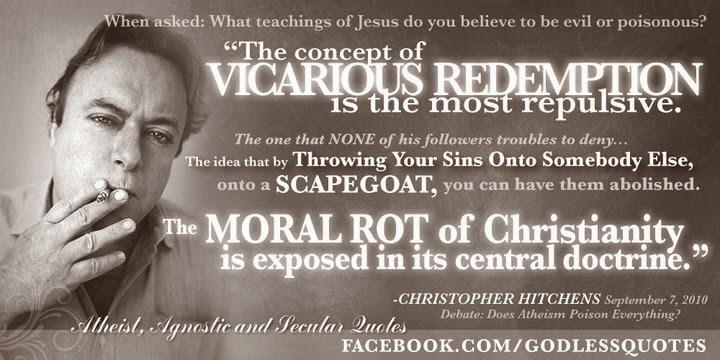


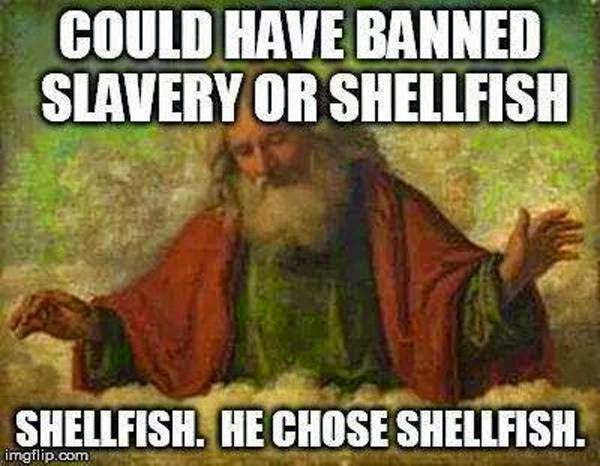


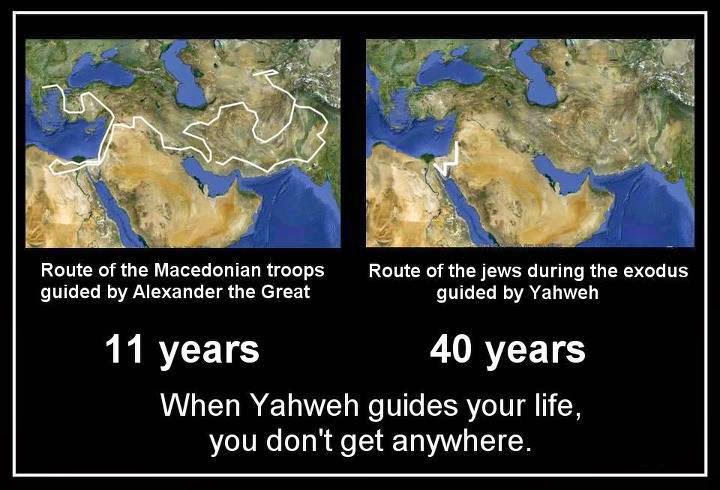
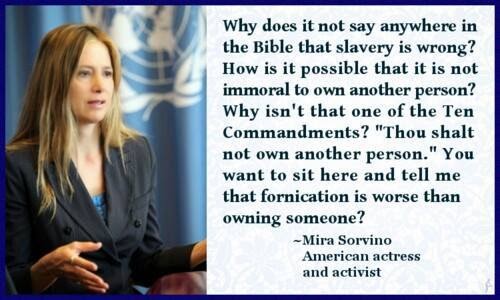
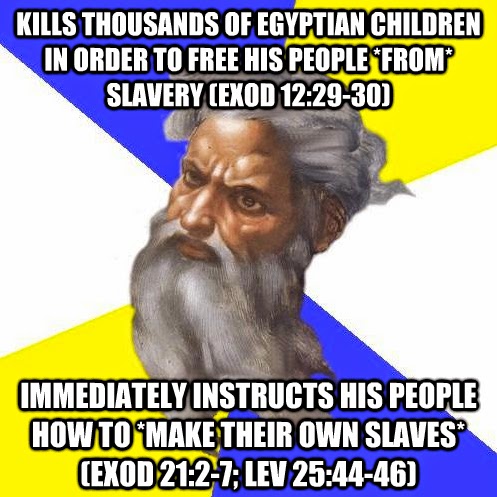
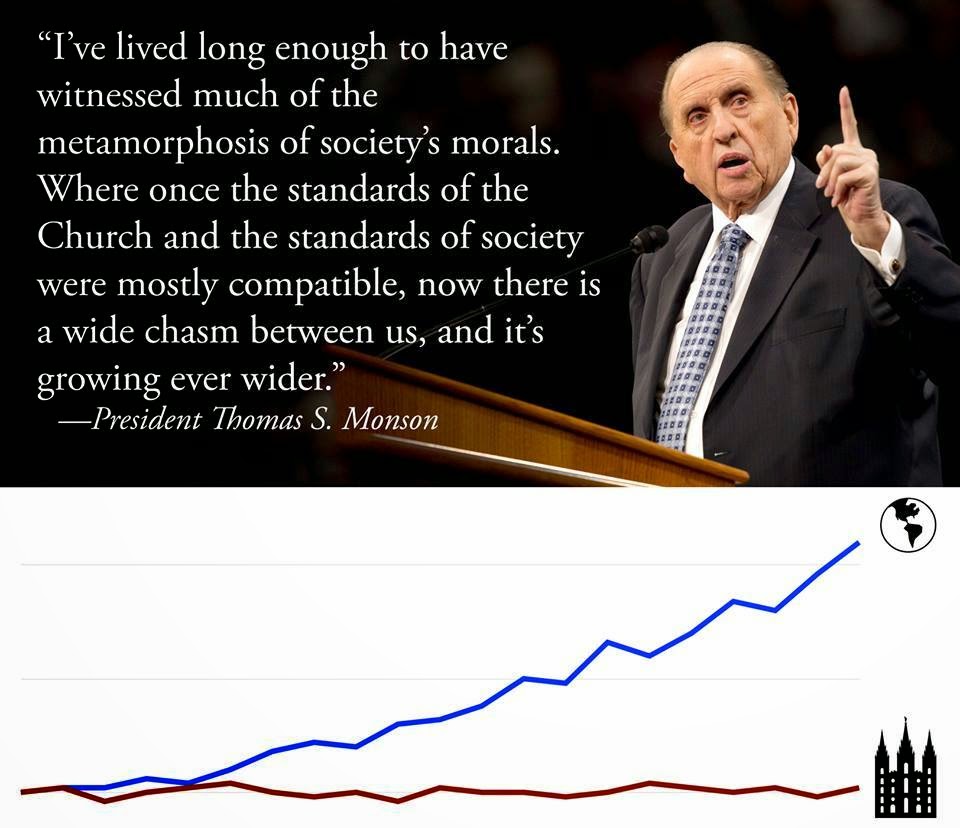

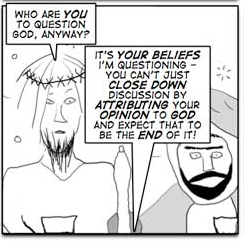










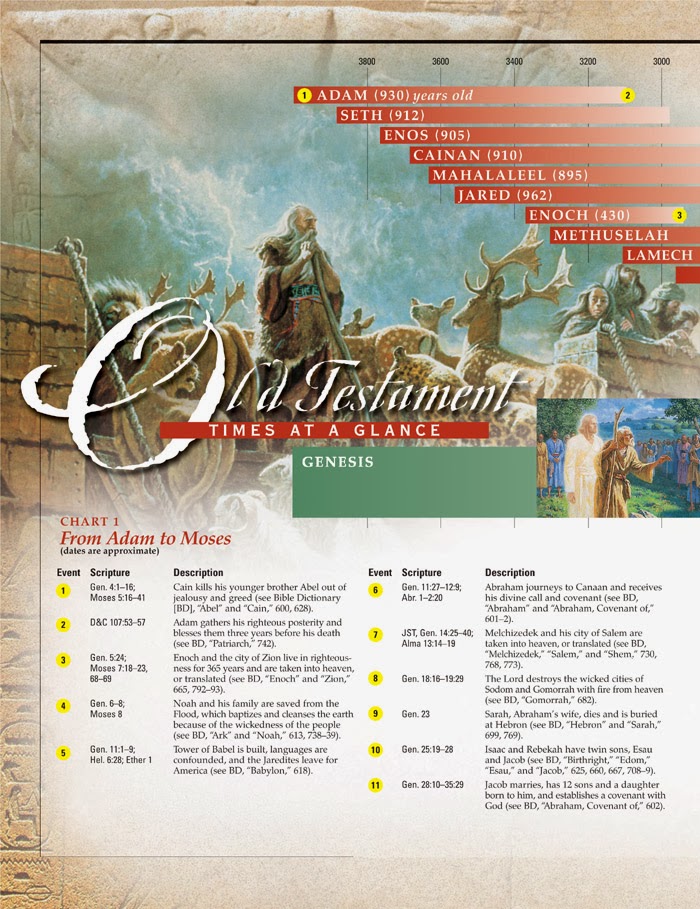
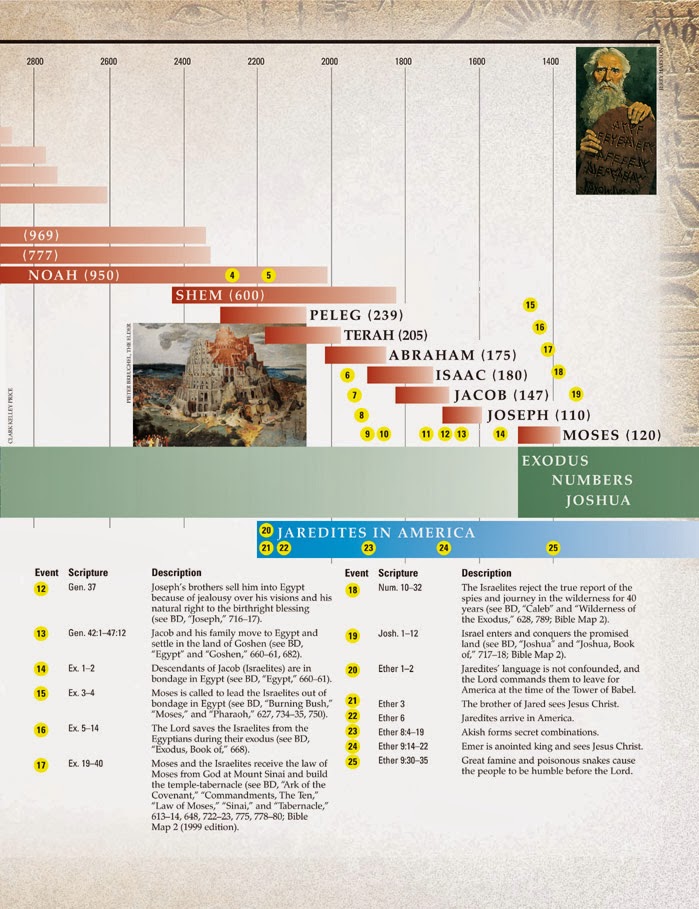
Recent Comments